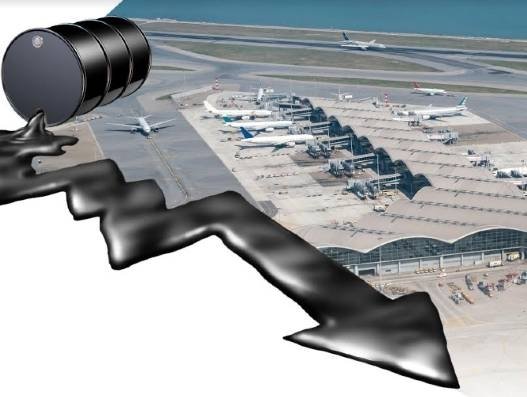
FROM MAGAZINE: Sinking oil prices bring little cheer to aviation industry
The dip in oil prices have provided a short-term cheer to the aviation sector, but practically no airline is celebrating reduced price, as demand has been hugely affected due to the passenger travel restriction. Even though cargo has fastened seat belts in passenger cabins, airlines are not finding economically viable

The dip in oil prices have provided a short-term cheer to the aviation sector, but practically no airline is celebrating reduced price, as demand has been hugely affected due to the passenger travel restriction. Even though cargo has fastened seat belts in passenger cabins, airlines are not finding economically viable to fly only critical goods as they are losing out payloads in oil-dependent economies and the business they gain out of consumer goods.
As Covid-19 is causing demand destruction for Chevron, Air BP, Total or Shell, and even the Organization of the Petroleum Exporting Countries (OPEC) proving powerless to stop oil prices from crashing –there seems to be a birth of new bull market.
The International Air Transport Association (IATA) data released in April shows that the Covid-19 crisis will see airline passenger revenues drop by $314 billion in 2020, a 55 percent decline compared to 2019. The collapse in global passenger flights has left airlines with fresh challenges: how to manage over hedged jet fuel positions as oil prices crashed to just a third of some contracts agreed in anticipation of rising prices and solid air travel demand.
Jet fuel price continues to stay as a debatable topic in the aviation industry. Observing on the advantage derived out of the nosediving fuel prices, Ed Gillett, director, CharterSync states, “Currently, with demand outstripping supply, there is no sign of airlines planning to reduce rates any time soon despite the lower fuel prices. If at all it happens, the US carriers will be the first to provide this price reduction as they hedge a lot of fuel but less compared to the European and Asian carriers.”
For instance, Singapore Airlines hedged at 51 percent of its jet fuel requirements for the April 2020 – March 2021 period at $74 per barrel. Air France-KLM hedged 65 percent of 2020’s expected fuel needs at around $65/barrel. Similarly, British Airways, Ryanair, Lufthansa AG, Norwegian Air, and Cathay Pacific Airways also have hedged positions.
From paying $65 per barrel in January, $58 in February, $50 in March and $22 in April, if you feel that the airlines (which are not hedged) are profiting from this opportunity due to the sinking oil prices, the scepticism revolves as several oil-dependent countries are going to experience an economic crisis that will have a serious impact on the aviation industry.
SanjeevGadhia, founder and CEO of Astral Aviation says, “The sharp drop in oil prices will have a short-term benefit for the aviation sector as the fuel component is about 30 percent of our operating cost and is directly linked to profitability. According to IATA, the global airline industry’s fuel bill is estimated to have totalled $188 billion in 2019 (accounting for around 23.7 percent of operating expenses at an average price of $65/barrel Brent).”
Astral operates scheduled B747Fs from its Liege Hub to oil & gas dependent economies such as Lagos, Nigeria; Luanda, Angola; Libreville, Gabon, and regular charters into Brazzaville, Congo. The cargo carrier estimates a significant reduction in payloads in these markets from May.
CharterSync has seen a substantial increase in the number of bookings during Covid-19. Last month, the platform saw over 30 open requests running at the same time from 9 different customers.
Gillett states, “Our surge in air cargo charter bookings can be greatly linked towards the requirement to deliver time-critical aid relief during this pandemic, and not a direct result of plummeting oil prices. Nevertheless, the overwhelming demand to operate passenger aircraft with cargo in the belly hold would not have been viable for airlines without the drop in oil prices.”
The decline in fuel prices will have a marginal effect on the aviation sector as the fundamental problem is the drop in cargo capacity and volumes (except pharma and PPE) as a result of the lockdown in various parts of the world. “The shutdown affects the retail and hospitality sector which contribute to the air cargo sector, however the increase in demand for pharma and PPE’s from China to Africa has increased the number of charter flights,” Gadhia added.
Responding to the question on whether the fall in oil price tends to rejuvenate the business of several airlines entering into bankruptcy, Gadhia notes, “The low fuel price will benefit the aviation sector with a competitive cost structure which will result in improved margins and profitability, which can be seen as a benefit during the current crisis for airlines slipping into business rescue programmes.”
In light of the Covid-19 and significant uncertainty around resulting travel restrictions and passenger demand, concerns about travel due to the pandemic or precautions such as physical distancing, as well as the overall economic environment and recent significant volatility in fuel prices and foreign exchange rates, makes it difficult to provide assumptions around GDP or fuel prices.
The global airline industry is battling one of its biggest crises in decades, which has led to fleets being grounded around the world and carriers turning to governments for state support. As more countries remain locked down and businesses remain shut, the demand for oil will remain low, leaving prices equally low. Meanwhile, IATA warned that the airlines are expected to burn through $61billion of their cash reserves during the second quarter of this year. With rigid competition in aviation, even small market shocks or price variables mean that a profitable airline can also quickly fall into debt and begin to burn up cash reserves.
This feature was originally published in May 2020 issue of The STAT Trade Times.

